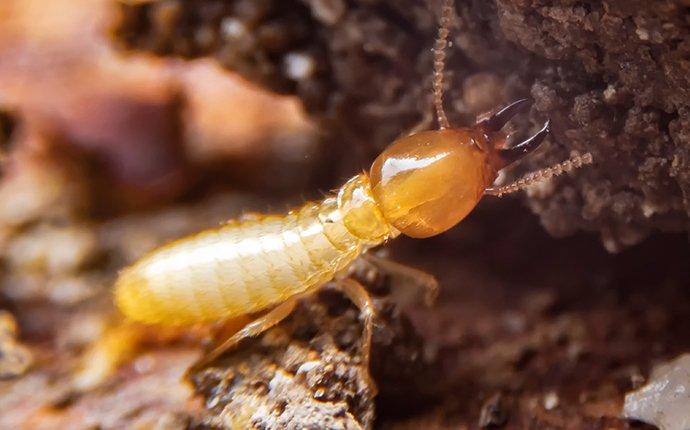Effective Ant Control: Expert Services to Remove Ant Infestations
Effective Ant Control: Expert Services to Remove Ant Infestations
Blog Article
Ecological Influence of Pest Control: Balancing Effectiveness With Sustainability
The environmental effect of pest control is a critical problem that needs a fragile equilibrium in between achieving performance in handling pests and making sure sustainability of our ecological communities. From the use of dangerous chemicals that leak into our soil and water to the unintended consequences on non-target types, the effects of standard pest control techniques are far-reaching.
Hazardous Chemicals in Parasite Control
The application of damaging chemicals in insect control presents considerable environmental and health risks that require cautious factor to consider and reduction methods. Herbicides, pesticides, and chemicals are frequently used to eradicate pests, yet their widespread application can bring about unplanned effects. These chemicals can infect dirt, water sources, and the air, influencing not only the targeted insects yet also useful insects, wildlife, and humans.

To deal with these dangers, incorporated parasite management (IPM) methods are being advertised as an extra lasting option. IPM entails a mix of methods such as biological control, habitat adjustment, and the targeted usage of pesticides as a last option (ant control concord nc). By embracing a holistic technique to pest control, we can lessen the environmental and health and wellness effects connected with harmful chemicals while properly managing pest populaces
Influence On Non-Target Variety
Thinking about the unintended repercussions of bug control approaches, the influence on non-target varieties is a crucial aspect that needs extensive evaluation. While insect control measures aim to target specific bugs, other microorganisms in the ecological community might be inadvertently affected. Non-target types, consisting of valuable insects, birds, mammals, and even plants, can experience straight or indirect injury from chemical applications or organic control methods.
Insecticides made to combat a specific insect parasite might harm pollinators like bees or all-natural killers such as ladybugs. Biological control representatives, if not species-specific, can position risks to unintended targets, disrupting the ecological equilibrium.
To minimize the effect on non-target species, incorporated insect monitoring (IPM) approaches that stress a holistic method to pest control are recommended. These methods focus on the use of environmentally friendly techniques, minimizing damage to helpful organisms while efficiently handling pest populaces. Performing extensive threat evaluations and keeping an eye on the end results of pest control initiatives are crucial action in safeguarding non-target species and advertising general environment health and wellness.
Soil and Water Contamination
Unintentional ecological effects of pest control approaches prolong past influencing non-target species, with significant ramifications for dirt and water contamination. Pesticides, herbicides, and chemical fertilizers used in parasite control can seep into the dirt and pollute groundwater, posturing a risk to both terrestrial and aquatic ecosystems. Dirt contamination can disrupt the equilibrium of microbes vital for vitamins and mineral cycling and plant development, leading to decreased dirt fertility and efficiency. Furthermore, these chemicals can linger in the environment for prolonged durations, building up in the dirt and possibly going into the food web.
Water contamination is another crucial problem related to parasite control techniques. Overflow from agricultural areas treated with chemicals can bring these chemicals into close-by water bodies, affecting aquatic microorganisms and water high quality. Pollutants in water resources can have far-reaching repercussions, influencing not only aquatic life yet additionally human wellness with the consumption of infected water or marine organisms. To mitigate soil and water contamination from parasite control tasks, integrated parasite administration techniques that focus on sustainability and decrease chemical inputs are essential.
Air Pollution From Pesticide Use
Direct exposure to airborne pesticides throughout agricultural applications postures a considerable problem for air pollution control procedures. Additionally, pesticide drift, where pesticides are brought by the wind to unplanned locations, can lead to the contamination of neighboring environments and water bodies.

Methods for Lasting Pest Control
In the world of agricultural practices, executing lasting pest control techniques is extremely important for keeping ecological equilibrium and securing crop returns. Sustainable pest control stresses the use of environmentally pleasant approaches to handle pest populaces properly while reducing damage to non-target microorganisms and ecosystems. Integrated Insect Monitoring (IPM) is a widely embraced approach that combines biological, cultural, physical, and chemical control techniques to attain long-term bug management options.
One trick technique in sustainable insect control is promoting biodiversity within agroecosystems. By enhancing all-natural opponents of parasites, such as parasitoids and predators, farmers can lower the requirement for artificial chemicals. Crop rotation and diversification are likewise efficient strategies to interrupt pest life process and create much less beneficial conditions for bugs to flourish. Additionally, making use of pest-resistant plant ranges and utilizing techniques like trap cropping can help in reducing insect stress without counting heavily on chemical treatments. Ultimately, by integrating these sustainable parasite control techniques, farmers can attain a balance between pest monitoring efficiency and environmental stewardship.
Verdict
Finally, the ecological effect of bug control approaches have to be very carefully considered to balance efficiency with sustainability. Unsafe chemicals used in pest control can lead to dirt and water contamination, air contamination, and injury non-target species - termite control services. It is vital to implement sustainable insect control techniques to minimize these negative effects on the atmosphere and advertise a healthier ecosystem for future generations
By embracing an all natural method to pest control, we can lessen the environmental and health influences associated with hazardous chemicals while properly taking care of pest populations.

To minimize the air pollution check over here triggered by pesticide use, it is vital to take on incorporated insect monitoring strategies that prioritize the use of non-chemical parasite control techniques, such as plant rotation, natural killers, and immune plant varieties. Sustainable insect control stresses the use of eco pleasant methods to take care of bug populaces efficiently while minimizing damage to non-target microorganisms and environments. Integrated Insect Management (IPM) is an extensively embraced method that combines biological, cultural, physical, and chemical control techniques to attain long-lasting bug monitoring remedies.
Report this page